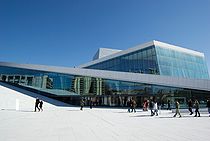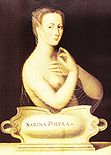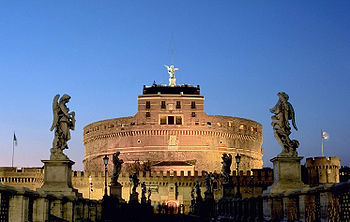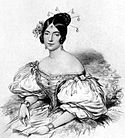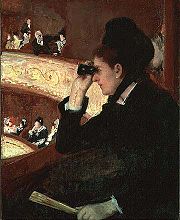- Portal:Opera
-
- Wikipedia portals:
- Culture
- Geography
- Health
- History
- Mathematics
- Natural sciences
- People
- Philosophy
- Religion
- Society
- Technology
The Opera Portal
Opera is an art form in which singers and musicians perform a dramatic work (called an opera) which combines a text (called a libretto) and a musical score. Opera is part of the Western classical music tradition. Opera incorporates many of the elements of spoken theatre, such as acting, scenery and costumes and sometimes includes dance. The performance is typically given in an opera house, accompanied by an orchestra or smaller musical ensemble.
Opera started in Italy at the end of the 16th century (with Jacopo Peri's lost Dafne, produced in Florence around 1597) and soon spread through the rest of Europe: Schütz in Germany, Lully in France, and Purcell in England all helped to establish their national traditions in the 17th century. However, in the 18th century, Italian opera continued to dominate most of Europe, except France, attracting foreign composers such as Handel. Opera seria was the most prestigious form of Italian opera, until Gluck reacted against its artificiality with his "reform" operas in the 1760s. Today the most renowned figure of late 18th century opera is Mozart, who began with opera seria but is most famous for his Italian comic operas, especially The Marriage of Figaro, Don Giovanni, and Così fan tutte, as well as The Magic Flute, a landmark in the German tradition.
The first third of the 19th century saw the highpoint of the bel canto style, with Rossini, Donizetti and Bellini all creating works that are still performed today. It also saw the advent of Grand Opera typified by the works of Meyerbeer. The mid to late 19th century is considered by some a golden age of opera, led by Wagner in Germany and Verdi in Italy. This 'golden age' developed through the verismo era in Italy and contemporary French opera through to Puccini and Strauss in the early 20th century. During the 19th century, parallel operatic traditions emerged in Central and Eastern Europe, particularly in Russia and Bohemia. The 20th century saw many experiments with modern styles, such as atonality and serialism (Schoenberg and Berg), Neo-Classicism (Stravinsky), and Minimalism (Philip Glass and John Adams). With the rise of recording technology, singers such as Enrico Caruso became known to audiences beyond the circle of opera fans. Operas were also performed on (and written for) radio and television.
More about Opera... Selected article
L'incoronazione di Poppea (SV 308, The Coronation of Poppea) is an Italian baroque opera comprising a prologue and three acts, first performed in Venice during the 1642–43 carnival season. The music, attributed to Claudio Monteverdi, is a setting of a libretto by Giovanni Francesco Busenello. One of the first operas to use historical events and people rather than classical mythology, it adapts incidents from the writings of Tacitus, Suetonius and others to recount how Poppea, mistress of the Roman emperor Nerone (Nero), is able to achieve her ambition and be crowned empress. The opera was revived in Naples in 1651, but was then neglected until the rediscovery of the score in 1888, after which it became the subject of scholarly attention in the late 19th and early 20th centuries. Since the 1960s the opera has been performed and recorded many times. In a departure from traditional literary morality it is the adulterous liaison of Poppea and Nerone which triumphs, although this victory is demonstrated by history to have been transitory and hollow. Moreover, in Busenello's version of the story all the major characters are morally compromised. Written when the genre of opera was only a few decades old, the music for L'incoronazione di Poppea has been praised for its originality, its melody, and for its reflection of the human attributes of its characters. The work helped to redefine the boundaries of theatrical music, and established Monteverdi as the leading musical dramatist of his time.Featured picture
The Castel Sant'Angelo in Rome, a papal fortress and prison until 1901. It serves as the setting for Act III of Puccini's opera Tosca. After murdering Rome's chief of police, the evil Baron Scarpia, Floria Tosca goes to the Castel Sant' Angelo, where her lover, Mario Cavaradossi, is to be executed. She has been led to believe that it will be a mock execution and is horrified to see him die in a hail of real bullets. As Scarpia's henchmen arrive to arrest her, she throws herself from the castle's ramparts. Famously dismissed by the musicologist Joseph Kerman as a "shabby little shocker", Tosca has become one of the most enduring works in the operatic repertoire.
In this month
- 12 November 1898 – Enrique Granados' opera María del Carmen had its world premiere at the Teatro de Parish in Madrid.
- 13 November 1868 – Gioachino Rossini, the composer of The Barber of Seville, La Cenerentola, William Tell and 36 other operas, died in Paris at the age of 76.
- 17 November 1898 – Umberto Giordano's opera Fedora had its world premiere in Rome conducted by Giordano himself with Gemma Bellincioni in the title role.
- 17 November 1936 – The celebrated contralto, Ernestine Schumann-Heink, died in Los Angeles at the age of 75.
- 27 November 1758 – Senesino (pictured), the celebrated Italian castrato who created 17 leading roles in Handel's operas, died in Siena, the city of his birth, at the age of 72.
- 27 November 1880 – Rome's main opera house, the Teatro Costanzi (now known as the Teatro dell'Opera di Roma), was officially inaugurated with a performance of Rossini's Semiramide.
- 29 November 1797 – Gaetano Donizetti, the composer of Lucia di Lammermoor, La fille du régiment, and L'elisir d'amore was born in Bergamo.
- 30 November 1866 – The tenor and opera impressario, Andreas Dippel, was born in Kassel, Germany.
More anniversaries...Selected biography
Eugenia Tadolini (née Savorani) (9 July 1809 – 11 July 1872) was an Italian operatic soprano. Admired for the beauty of her voice and stage presence, she was one of Donizetti's favourite singers. During her career she created over 20 leading roles, including the title roles in Donizetti's Linda di Chamounix and Maria di Rohan and Verdi's Alzira. She was born in Forlì and studied music there and in Bologna before making her debut in Florence in 1828. She sang in all of Italy's leading opera houses, as well as in Paris, Vienna, and London before retiring from the stage in 1852. She spent her remaining years first in Naples, where she had been the Teatro San Carlo's reigning prima donna for many years, and then in Paris, where she died of typhoid fever at the age of 63. From 1827 to 1834, she was married to the Italian composer and singing teacher, Giovanni Tadolini.Selected quote
Selected audio
"Nè gustare m'è dato un'ora..." From Giuseppe Verdi's La forza del destino,
sung by Enrico Caruso and Giuseppe de Luca.Did you know...
- ...that although Thomas S. Hamblin (pictured) preferred ballet and opera, he staged low-brow melodrama, farce, and variety acts at the Bowery Theatre?
- ...that the painting The Face on the Barroom Floor, in Central City, Colorado, was inspired by a poem, and that it in turn inspired a chamber opera?
- ... that professional wrestler Antonio Pugliese was a fan of opera music and would sing opera before his matches?
WikiProjects
- Parent projects
WikiProject Arts • WikiProject Music • WikiProject Theatre
- Main project
WikiProject Opera
- Descendant projects
WikiProject Richard Wagner • WikiProject Gilbert and Sullivan
- Similar projects
WikiProject Classical music • WikiProject Contemporary music • WikiProject Composers
What are WikiProjects?
Main topics
Opera history: Origins of opera • Italian opera • Opera in German • French opera • Opera in English • Polish opera • Russian opera • Hungarian opera • Armenian opera • Opera in Latin America
Opera genres: Azione teatrale · Ballad opera · Comédie en vaudeville · Comédie mêlée d'ariettes · Dramma giocoso · Dramma per musica · Farsa · Festa teatrale · Género chico · Grand Opera · Music Drama · Opéra-ballet · Opera buffa · Opéra bouffe · Opéra bouffon · Opéra comique · Opéra féerie · Opera semiseria · Opera seria · Operetta · Pastorale héroïque · Romantische Oper · Savoy opera · Semi-opera · Singspiel · Spieloper · Tragédie en musique · Verismo · Zarzuela · Zeitoper
Opera terms: Aria · Aria di sorbetto · Arioso · Bel canto · Breeches role · Burletta · Cabaletta · Cadenza · Cantabile · Castrato · Cavatina · Chest voice · Claque · Coloratura · Comprimario · Convenienze · Coup de glotte · Da capo aria · Diva · Entr'acte · Fach · Falsetto · Fioritura · Gesamtkunstwerk · Head voice · Intermezzo · Kammersänger · Leitmotif · Legato · Libretto · Literaturoper · Mad scene · Maestro · Melodrama · Melodramma · Monodrama · Messa di voce · Opera house · Passaggio · Portamento · Prima donna · Prompter · Recitative · Regietheater · Répétiteur · Sitzprobe · Spinto · Sprechgesang · Squillo · Stagione · Surtitles · Tessitura · Timbre · Vibrato
Opera voices: Baritenor · Baritone · Bass · Bass-baritone · Coloratura soprano · Contralto · Countertenor · Dramatic soprano · Haute-contre · Lyric soprano · Mezzo-soprano · Soprano · Soubrette · Spinto soprano · Tenor · Tenore contraltino · Tenore di grazia
Opera lists: Opera topics • The opera corpus • Important operas • Major opera composers • Opera librettists • Opera houses • Opera companies • Opera festivals • Opera directors • Operetta composers • Orphean operas • Zarzuela composers • Opera genres • Operas set in the Crusades • The Record of Singing • Bayreuth canon
Featured content
Featured articles
Featured lists
Good articles
 Orfeo ed Euridice
Orfeo ed Euridice Antonio Paoli
Antonio Paoli Johann Strauss II
Johann Strauss II Twice Through the Heart
Twice Through the Heart Wales Millennium Centre
Wales Millennium Centre
Things you can do

- Add {{Portal|Opera}} to the See also section of opera-related articles.
- Tag the talk pages of opera-related articles with {{WikiProject Opera}}
- Join WikiProject Opera and list yourself as a participant in the project.
- Cleanup: A cleanup listing for this project is available, updated weekly. More information...
- Notability: Articles with notability concerns, listed at WikiProject Notability
- Rate the Unassessed opera articles in the Opera WikiProject.
- Requested articles: Create or request an article on an opera-related topic.
- Stubs needing expansion: English-language opera stubs, French-language opera stubs, German-language opera stubs, Italian-language opera stubs, Opera biography stubs, Opera company stubs, Opera singer stubs, Opera structure stubs, More...
Categories
[×] Opera composers[×] Opera critics[×] Opera designers[×] Opera excerpts[×] Opera museums[×] Opera publishers FA
FA  A
A  GA
GA B C Start Stub  FL
FL List NA ??? Total 17 0 10 140 187 4,530 2,660 3 164 1,377 33 9,121 Related portals
Associated Wikimedia
Categories:- Opera
- Opera portal
Wikimedia Foundation. 2010.

